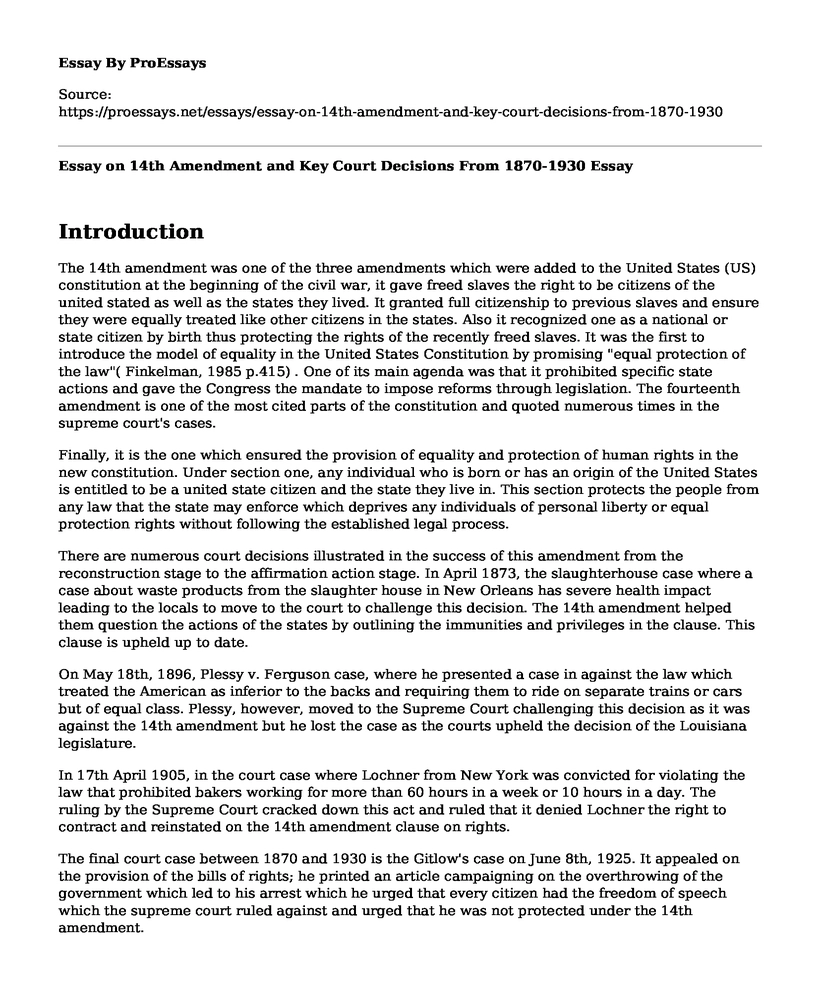Introduction
The 14th amendment was one of the three amendments which were added to the United States (US) constitution at the beginning of the civil war, it gave freed slaves the right to be citizens of the united stated as well as the states they lived. It granted full citizenship to previous slaves and ensure they were equally treated like other citizens in the states. Also it recognized one as a national or state citizen by birth thus protecting the rights of the recently freed slaves. It was the first to introduce the model of equality in the United States Constitution by promising "equal protection of the law"( Finkelman, 1985 p.415) . One of its main agenda was that it prohibited specific state actions and gave the Congress the mandate to impose reforms through legislation. The fourteenth amendment is one of the most cited parts of the constitution and quoted numerous times in the supreme court's cases.
Finally, it is the one which ensured the provision of equality and protection of human rights in the new constitution. Under section one, any individual who is born or has an origin of the United States is entitled to be a united state citizen and the state they live in. This section protects the people from any law that the state may enforce which deprives any individuals of personal liberty or equal protection rights without following the established legal process.
There are numerous court decisions illustrated in the success of this amendment from the reconstruction stage to the affirmation action stage. In April 1873, the slaughterhouse case where a case about waste products from the slaughter house in New Orleans has severe health impact leading to the locals to move to the court to challenge this decision. The 14th amendment helped them question the actions of the states by outlining the immunities and privileges in the clause. This clause is upheld up to date.
On May 18th, 1896, Plessy v. Ferguson case, where he presented a case in against the law which treated the American as inferior to the backs and requiring them to ride on separate trains or cars but of equal class. Plessy, however, moved to the Supreme Court challenging this decision as it was against the 14th amendment but he lost the case as the courts upheld the decision of the Louisiana legislature.
In 17th April 1905, in the court case where Lochner from New York was convicted for violating the law that prohibited bakers working for more than 60 hours in a week or 10 hours in a day. The ruling by the Supreme Court cracked down this act and ruled that it denied Lochner the right to contract and reinstated on the 14th amendment clause on rights.
The final court case between 1870 and 1930 is the Gitlow's case on June 8th, 1925. It appealed on the provision of the bills of rights; he printed an article campaigning on the overthrowing of the government which led to his arrest which he urged that every citizen had the freedom of speech which the supreme court ruled against and urged that he was not protected under the 14th amendment.
Conclusion
The 14th amendment provides a clause for equal protection of human rights, protection against racism ethnicity or gender. It also advocates for equal educational opportunities among all the citizens in the state. The impact of the 14th amendment on Indian Americans, African Americans and Asian America has positively. This amendment pushed for equal treatment of all persons in the state despite their race or religion, thus marked a huge milestone in the fight for civil war.
Works Cited
Finkelman, Paul. "Prelude to the Fourteenth Amendment: Black legal rights in the antebellum North." Rutgers LJ 17 (1985): 415.
Cite this page
Essay on 14th Amendment and Key Court Decisions From 1870-1930. (2022, Apr 07). Retrieved from https://proessays.net/essays/essay-on-14th-amendment-and-key-court-decisions-from-1870-1930
If you are the original author of this essay and no longer wish to have it published on the ProEssays website, please click below to request its removal:
- Comprehensive Immigration Reform Law Essay
- The Scopes Trial: A Brief History With Documents by Jeffrey P. Moran Paper Example
- Essay Example on Central America: Peace and Democracy After 1992 Peace Accord
- Colorblindness: A Security Risk in Criminology & Airport Security - Essay Sample
- Essay on Liberalism: An Age-Old Political Theory for Balancing Government Power
- Paper Example on Governments Create Public Health Law to Combat Covid-19
- Paper Example on DACA: Protecting Thousands of Illegal Immigrants in the US







